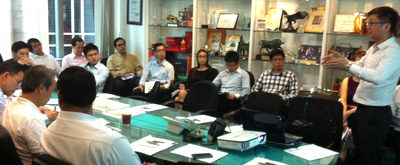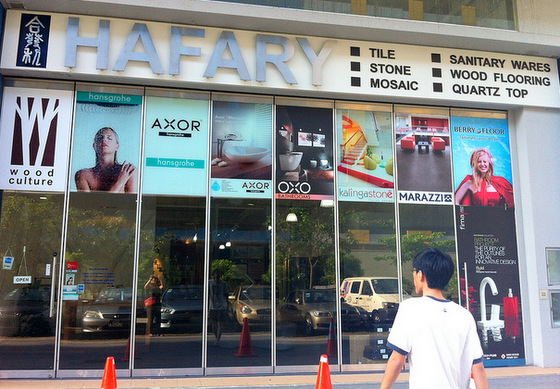 Joshua Wu (left), a shareholder of Hafary, works in the commodity derivatives sector and is a frequent visitor to www.NextInsight.net In his investing, he targets a combination of growth and dividend Singapore-listed stocks and his portfolio has gained 30% in the year-to-date, outperforming the Straits Times Index which is flat.
Joshua Wu (left), a shareholder of Hafary, works in the commodity derivatives sector and is a frequent visitor to www.NextInsight.net In his investing, he targets a combination of growth and dividend Singapore-listed stocks and his portfolio has gained 30% in the year-to-date, outperforming the Straits Times Index which is flat. Hafary financial controller Jackson Tay (extreme right) with analysts and fund managers.
Hafary financial controller Jackson Tay (extreme right) with analysts and fund managers.
Photo by Tang Yibing.I FIRST TOOK an interest in Hafary Holdings in August this year when I was doing my regular stock screening.
Hafary stood out due to its considerable dividends and I decided to further analyze the stock. More recently, I had the opportunity to attend an investor presentation by the financial controller, Jackson Tay, and consolidated my takeaways from the session with my analysis below.
Hafary's reputation as a good dividend paying stock is well deserved but that should not obscure its growth potential as management is constantly seeking new opportunities to boost its bottom line.
First, the positives:
1) Hafary paid out a very generous 6.5 cents for FY13, which translates to an astounding 28% dividend yield. The bulk of it comprises a one-off realised property gain. If you strip that out, going forward, the company is projected to pay a dividend amounting to a yield of 6 -7% which is very respectable in the current market environment.
2) Exposure to a booming HDB market and increasing contribution from their project segment: Strong construction demand will boost project demand for tiles
The Government has been rolling out massive supplies of new HDB flats and as the leading tiles supplier in Singapore, Hafary is poised to benefit.
Demand for tiles looks set to increase in the next 3 years as 100,000 more flats are expected by 2016. In fact their Public Project sales have hit $13.1 million which is more than triple that in 2012. Notable projects delivered include NUH Medical Centre, J-Cube, The Atrium@Orchard, MRT stations, IMM Building, Changi Business Park and Carlton City Hotel.  Hafary has three showrooms -- in Eunos (the newest and biggest), Balestier and Trade Hub 21 (above). Photo: http://theitsybits.blogspot.sg/2012/05/flooring-hunt.html
Hafary has three showrooms -- in Eunos (the newest and biggest), Balestier and Trade Hub 21 (above). Photo: http://theitsybits.blogspot.sg/2012/05/flooring-hunt.html
3) Strong management / efficient logistics – Their core management strength has been the ability to identify where potential for growth is.
Notable examples include made-in-China tiles which gave them a big competitive edge. Italian tiles subsequently became popular with bungalow owners and Hafary was quick to become the biggest importer of Italian tiles.
The company has identified further avenues for growth which I will touch on shortly although their failed investment in HCCM in China remains a slight blemish on their record.
It is worth noting that they have completely written off this investment, which means all negativity in relation to this should already be priced in. It remains to be seen if management can continue to source for overseas opportunities to diversify their income stream. At the logistics end, Hafary should enjoy greater manpower and transportation cost savings from the effective utilisation of their new warehouses.
4) Hidden value in Hafary: The company has 4 leasehold industrial buildings held at low cost on its balance sheet. Any plans to unlock their hidden value may be an upside catalyst for the stock price, and may take the form of a special dividend. Hafary could enter into sales-leaseback agreements to keep its balance sheet asset-light and boost ROA and unlock funds for expansion.
I shall not go into details here but the current open market valuation of its property portfolio exceeds the book value by approximately $40 million.
5) Financial highlights (based on last FY-end share price of 19.1 cents)
Profit before tax CAGR of 21.2% over the past 7 years.
Reasonable trailing P/E and P/B ratios of 8.3 and 1.7, respectively.
Reasonable gearing - Net debt / equity ratio of 1.2,
Interest cover 10.2 times,
Debt ratio 0.5 times
Net profit margin of 11.8% compares unfavourably to STI's average of 19% but respectable for their industry.
Risks
1) Reliance on the Singapore market - There is geographical and concentration risk with almost 100% of its revenue derived from Singapore although this is currently not a big concern as there is good earnings visibility for the next couple of years due to the above mentioned factors.
Looking beyond that, however, I would prefer to see the company make inroads into foreign markets and diversify its income stream. To be fair I expect to see more overseas interest in this area once the International Furniture Hub is up and running. Any further overseas ventures should also prove interesting. HCCM did not work out as mentioned, so the jury is still out on this.
2) Supply dependency on foreign manufacturers - Hafary does not produce tiles, so it has to be mindful of competition in this area which could erode their profit margins if more guys compete for the same pie.
3) Relatively illiquid stock with <25% free float.
Stocks with low free float tend to come with higher volatility and privatisation risks, especially in a depressed stock market. In a bear market, any privatisation attempts will be a lot less expensive.
Recent story: HAFARY: Riding On Building Boom Over The Next Few Years






